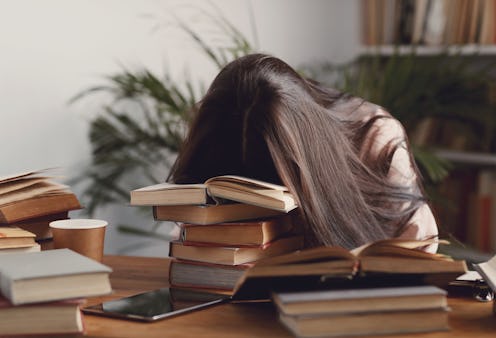Books
Having A Reading "Identity Crisis" Is More Common Than You Think

If you're here, there's a pretty high chance that you self-identify as a reader. Maybe you're such a bibliophile that even other people identify you as a reader. I can definitely relate. For as long as I can remember, I have always included "reader" as a major part of my own identity. Bedtimes spent asking for story after story, afternoons spent in the library, a job that requires me to write about books every day: in each stage of my life, reading has not only been a joy, or a preference, or a way that I've spent huge chunks of my time, it's been me. Or at least a big part of me.
Which is why, when November dawned dark and chilly this year, and I suddenly realized that I haven't really been reading much at all, I started to freak out a bit. To be a "reader" one must read, right? And you have to do it more so than you do a lot of other things, like take bubble baths or marathon Gilmore Girls on Netflix. I've never described myself as a "bather" or as a "Netflixer," but I sure have been doing those things more often than I've been reading. Enter: the identity crisis. Theorist Erik Erikson first coined the term identity crisis in 1963, and he believed that an identity crisis is a time of intensive analysis and exploration of different ways of looking at oneself.
According to an article in VeryWell Mind, what Erikson and other researchers have found is that when we make a strong commitment to our chosen identities — like mine as a reader — we are happier and healthier. So, when you're consistently smashing your 'To Be Read' pile and your book club discussions are intellectually stimulating and you've got a personal end of year best books list that's a mile long? If you identify as a reader, all of these things not only make you feel great, they make you secure in your identity. But when, like me this year, you haven't been reading as much as usual, or a lot of the books you have read have been disappointing, or you just haven't been prioritizing reading in your life? Yeah... that's when the identity crisis rears its ugly head.
But what makes an identity crisis occur in the first place? Apparently, it's got a lot to do with our modern day world. Identity crises tend to happen during times of great change or upheaval. And if you're alive in 2018 you know that those times are pretty intense right now — especially if you're in your twenties which is already a decade of uncertainty (hello, quarter-life crises.) Add to that the constant distractions of social media and other tech, and we're all super likely to have a reading identity crisis at some point in our early adulthood... and it's actually totally normal.
So, what can we do about this? Am I, and others like me, doomed to feel like a reading failure for the rest of my days? Will I have to change my identity from "reader" to "Netflixer" after all? Not quite. After all, we are the only ones in charge of our sense of identity. Erikson states that it is our own exploration of, and commitment to, different identities that allows us to achieve those identities in the first place — and we alone can alter how we relate to them. According to an article in Psychology Today by Lisa Firestone, Ph.D, a clinical psychologist, it is possible to change our sense of identity by calming our critical inner voice.
That part of your brain that tells you that you're not a reader unless you can get through a certain amount of books every month, or that you're not a reader if you don't enjoy a certain genre of books, or that you're not a reader if you're taking a break from reading? Yeah, it's time to shut that voice up. Firestone writes, "To become our true selves, we have to continually ask ourselves, 'Who am I really?' and 'What lights me up?' We have to be willing to call into question what we assimilated from our early environment that may not reflect who we are, and what makes life meaningful to us."
When I first chose "reader" as an identity, I was able to spend hours every day with a book. I didn't have Twitter on my phone to distract me. Actually, I didn't even have a phone. The voraciousness with which I read every single day was what first made me feel like a reader, sure, but that time has long since passed. But do books still "light me up?" Hell yes. And so now it's time for me, and maybe for you, to redefine those early reflections of what I thought made me a reader. So, I can't sit in the library for hours on end as an adult. So, I can't effortlessly read 50+ books every year anymore. I will always be a reader, because I choose to be. And from now on I'm making my own rules about what that truly means.